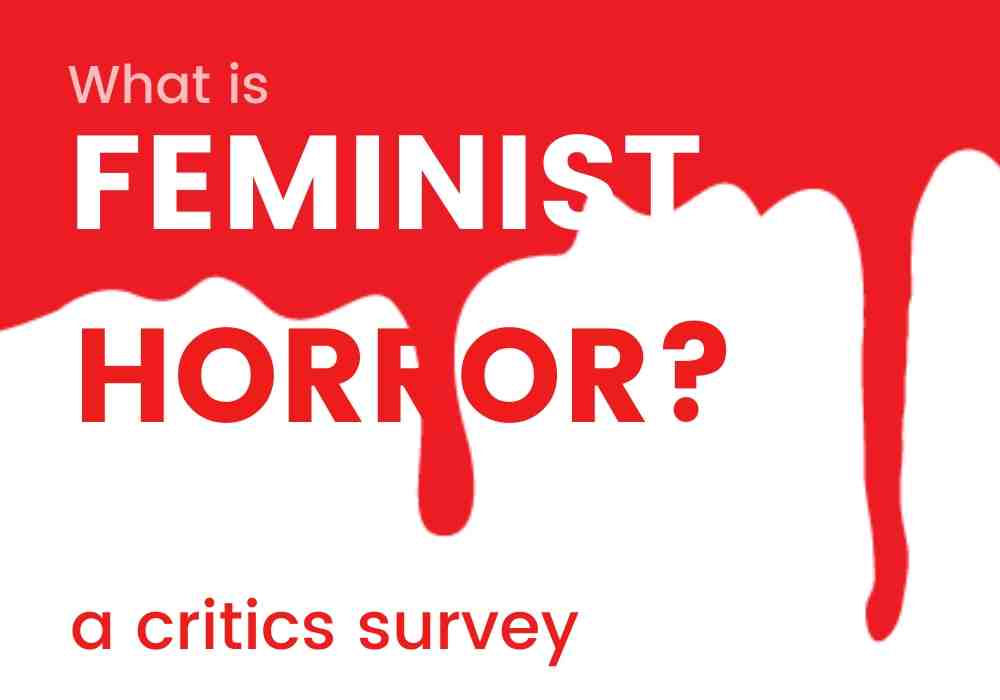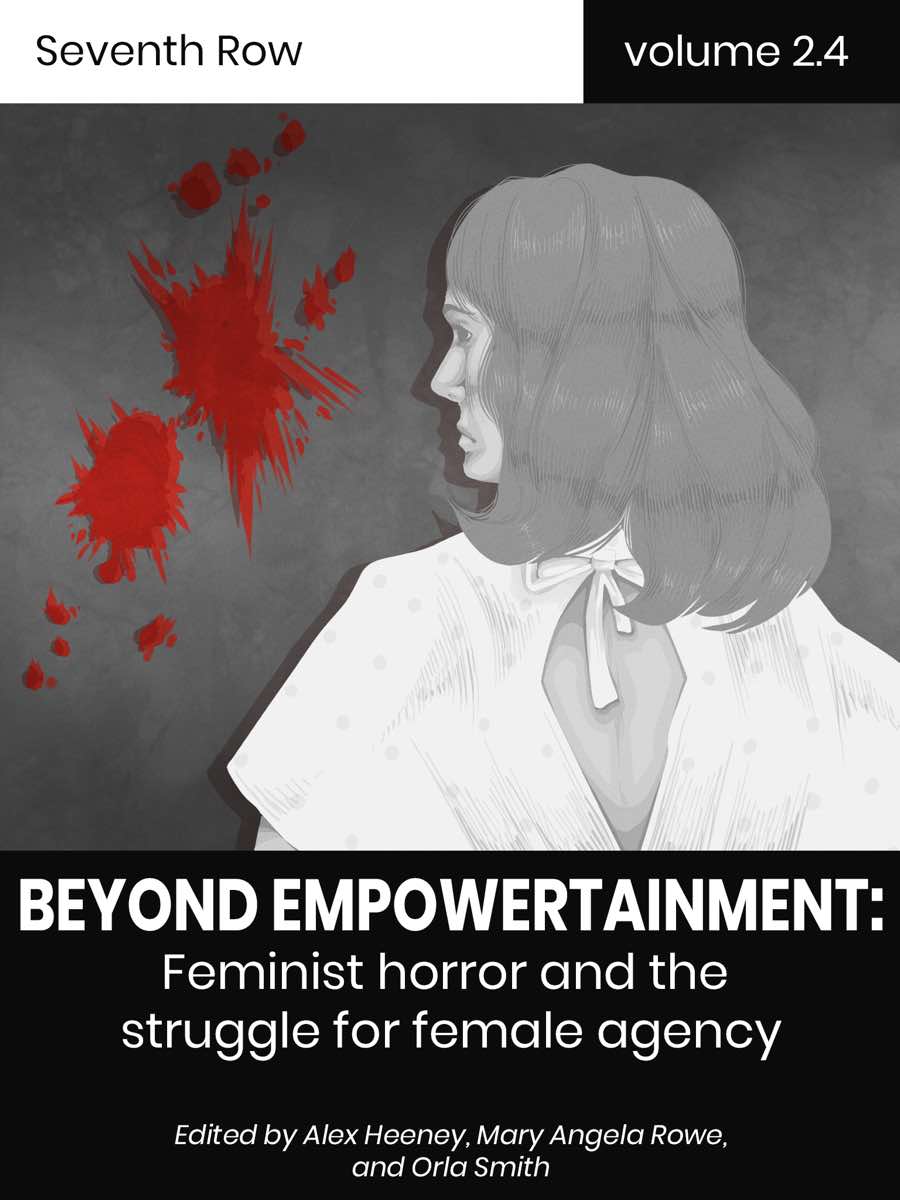Seventh Row asks critics what the term ‘feminist horror’ means to them, in anticipation of our ebook on the topic. You can pre-order the book here.

Discover one film you didn’t know you needed:
Not in the zeitgeist. Not pushed by streamers.
But still easy to find — and worth sitting with.
And a guide to help you do just that.
Our upcoming ebook, Beyond empowertainment: Feminist horror and the struggle for female agency, contains 20+ chapters in which various writers muse the question, ‘What is feminist horror?’ Through the lens of films such as Raw, Thelma, Unsane, Personal Shopper, Perfect Blue, Carrie, Prevenge, and more, that concept is explored. It’s a contentious and divisive question, and we wanted to hear what others had to say on the matter. Eight critics came back to us with their own personal interpretations of ‘feminist horror.’
Kelly Gredner, Film Critic, Spinsters of Horror
When a horror film shows the complexity of humankind, from the ugliness of our flaws to the beauty of our compassion, this is feminist horror. When a horror film doesn’t hesitate to show the fear that women experience on a daily basis, this is feminist horror. From our ever-changing bodies and intricate emotions, to how we are in a constant fight for our lives (emotionally, mentally, spiritually or even literally), feminist horror shows the nuances of being a woman. We live and breathe horror. It’s a place for women to scream their loudest into the void and finally be heard. In feminist horror, women find empowerment in being succubi, vampires, demons, witches, aliens, and more. But most importantly, feminist horror is a place where women are free.
Valeska Griffiths (@bitchcraftTO), Editor, Anatomy of a Scream
I think that feminist horror can mean a range of things, from empowering to challenging to validating to vengeful. The beauty of feminist horror or sociopolitical horror is the freedom that filmmakers have to utilize metaphor and symbolism to make deeper points about our cultural landscapes. Ideas about class, race, and gender can be obviously textual, but they can also be conveyed in subtle ways — this can lead to texts containing powerfully feminist messages even if they don’t feel explicitly political, which is a great way to transmit these messages to audiences that ordinarily shy away from challenging texts. When I watch feminist horror, I feel seen in a way that I don’t feel when watching other films. Cinematic experiences that hit the right chord can feel transformative, and I’d love for more diverse audiences to be able to experience that.
Alex Heeney (@bwestcineaste), Editor-in-Chief, Seventh Row
Many of the difficulties of being a woman are generally invisible: the micro-aggressions of misogyny, the experience of systemic sexism, and even the complex relationship women have with our bodies because of patriarchy. What I love about horror, as with any heightened storytelling, is that it makes visible the invisible, by amplifying and externalizing the fears and difficulties we face, as women, every day. In Unsane, the psychiatric hospital acts like the patriarchy, amplifying and externalizing its forces: Sawyer is treated as insane (not unrelated to the fact that she’s a woman), and because of this, slowly goes insane. In Prevenge, the revenge genre allows Alice Lowe to externalize the horrors of pregnancy and the related loss of control: is she killing because she no longer controls her impulses (her foetus is telling her to do so) or because she actually wants to do so? Prevenge complicates this even more by suggesting the revenge plot is itself a desperate attempt for the protagonist to cope with her grief, anger, and loss of control — by taking back control on this mission.
At the same time, horror films are uniquely able to take both sides in a morally ambiguous situation because the stakes are higher and everything is heightened. It’s a space where greater empathy is thus possible. Because the stakes in Thelma are life and death, we are able to empathize with the parents’ desire to control their daughter (out of love), in a way that we might not otherwise. At the same time, when Thelma needs to literally destroy her patriarch, it feels acceptable. We’re able to understand both Thelma’s loss of control and its traumatic effects on her and why her parents put her in this situation, out of desperation.
Shannon McGrew, Founder of Nightmarish Conjurings
What does feminist horror mean to me: it means equality, true equality. It’s about giving women the same chances that men have to explore varying degrees of themes and emotions outside of the standard tropes that we find ourselves in. It’s about diving deep within and expressing the pain and trauma, the tears and smiles, as well as our deepest fears, through a medium in which our voices can be heard far and wide.
Jessica Parant, Film Critic, Spinsters of Horror
Feminist horror, for me, engages with the feminine experience and uses the gruesome fantasy of horror to lay bare the actuality of what it is to be a woman, and it is not all rainbows and roses. Through engaging with the various themes of horror from rape-revenge, motherhood/sisterhood, coming of age/ageing, mental illness and sexuality, these types of horror films are able to address the damaging impact of the oppressive patriarchal system on the collective feminine body. As well, feminist horror gives legitimacy and a voice to the monstrous feminine by allowing women to express where their deepest and darkest internal struggles take them.
Horror doesn’t stray from the daunting truth but forces its viewers to witness it head-on. It is through the rawness of feminist horror that I have found empowerment. I have found a sisterhood of women with shared experiences and have found the means to heal from my own past traumas. I continue looking forward to the growth of feminism and how it continues to shape itself in the landscape of the horror genre.
Mary Angela Rowe (@lapsedvictorian), Editor-at-Large, Seventh Row
“Feminist horror” may seem like a contradiction in terms: horror is stereotyped as both lurid (read: lower class) and socially conservative, graphically punishing those who sin against conventional morality. But that also means horror speaks to the reality of a lot of women’s fears. For me, feminist horror is any horror text that is reasonably susceptible to a feminist interpretation, even if that’s not what its creators had in mind. A “feminist interpretation”, in turn, is a reading that presents the experiences, struggles, and internal complexity of women as equal to that of men. Because feminism is constantly evolving, feminist horror is also a moving target. A horror trope can be both sexist and feminist, depending on how you look at it (for example, the Final Girl). Feminist horror is in the eye of the beholder.
People like to be scared, as long as we can control the dosage. For people who experience oppression — women, people of colour, LGBTQ+ people, among others, and certainly to varying degrees — a low-level background hum of fear may accompany us throughout the day. Sometimes horror films can be cathartic. A lot of us have had the experience of watching a horror film, being repulsed by it, and then wanting to watch it again. Horror films can be hideously regressive to the point of cliche, but we can find ourselves drawn to them anyway. When we’re fascinated by a text it’s worth asking, ‘What is this movie doing for me? What feeling does it give me, and why do I want to experience it again?’
On a personal level, the horror texts I love most aren’t films with male antagonists. They are films that pit women against women, where men are observers or love interests or dinner (Raw; Guadagnino’s Suspiria; Ginger Snaps; Les Diaboliques; in literature, Carmilla and its young-adult novelization The Moth Diaries). Or they are texts in which men and women share an equal capacity for both victimhood and monstrosity (Audition; Hard Candy; arguably, Hannibal). These texts don’t necessarily ignore the reality of patriarchy, and in fact, many address it directly. But they do provide a fantasy of comeuppance. In these films, female villains are as likely as female heroes, just as powerful, and just as terrifying.
Justine Smith (@redroomrantings), Film Critic & Programmer of Fantasia Fest
In a lot of ways, I think the idea of “feminist horror” is antithetical. Horror, generally speaking, is predominantly conservative though I do not believe that is a bad thing: fears do not broaden horizons but close them off. But, if feminist horror does exist, it is in how it challenges prevailing points of view by offering to transgress against social and narrative expectations. It has to be feminism removed from empowerment, but connected to truthfulness and authenticity and the ability to be a real person; contradictory, ugly and dislikeable. They have to be movies that are in conversation with society at large and how it imposes gendered expectations (I would argue they don’t even necessarily have to feature a female protagonist).
It seems essential to mention Kier-La Janisses’s groundbreaking House of Psychotic Women as the pivotal text on the matter. As she addresses a great scope of horror history and unveils the deeply rooted contradictions of being a woman who loves horror — a genre that often positions femininity as the enemy. I have a lot of strong opinions on horror, and I believe all great horror is transgressive in some way; there has to be a fundamental rupture in the storytelling with society. Off the top of my head, the great films in feminist horror would be; Cat People (1942), Mother Joan of the Angels (1961), Black Christmas (1974), The Brood (1979), Twin Peaks: Fire Walk with Me (1992), Audition (1999), Ginger Snaps (2000), Dumplings (2004), The Skin I Live In (2011), The Babadook (2014), Raw (2016), Cam (2018).
Orla Smith (@orlamango), Executive Editor, Seventh Row
‘What is feminist horror?’ has been a pertinent question throughout the process of writing our book, Beyond empowertainment: Feminist horror and the struggle for female agency. Not to shamelessly self-promote, but I tried to grapple with this in one of my essays in the book — probably the most complex essay I’ve written for Seventh Row given it dissects five films. They’re all films that are taking a stab at feminist horror, portraying murderous women, but some do it better than others. Three of them, in my opinion, fail: Lady Macbeth, Beast, and Ex Machina. In these films (all first-features by white male directors), feminist horror is more of a commodity than a thoughtful approach. These films’ antiheroines are driven to sociopathy by overt misogyny, their emotions dampened so that they can kill mirthlessly. These deaths are often cathartic, celebrated moments by the audience.
In my positive examples, Raw and Thelma, however, women are at war with themselves more than they are with the world around them. These protagonists face misogyny still, perhaps in more nuanced ways, but their main battles are with their own complex, conflicting desires. Their ability to harm horrifies them, so moments of violence are more despairing than cathartic. Films that reflect and explore the intricate, often tumultous inner lives of women are far more feminist than those that simplisticly exhibit men being sexist (as if we need to be told that men can be sexist) and women enacting vengeful badassery.
Lena Wilson (@lenalwilson), Film Critic
In many ways, “feminist horror” is an oxymoron. As a genre founded on objectifying, degrading portrayals of sexual and physical violence against women — as in Alfred Hitchcock’s Marnie, exploitation staples like I Spit on Your Grave, the torture porn heyday of Saw, or this year’s Netflix release The Perfection — horror can induce a sort of feminist queasiness in any cognizant viewer. Yet horror’s elasticity, its playful waltzes along the boundaries of reality, make it the only genre in which some of the most important, outré displays of feminist storytelling are possible.
Only in horror can Dawn, the teenage protagonist of Mitchell Lichtenstein’s Teeth, castrate her rapists using the teeth within her vagina. Without the genre’s pulpy past, Anna Biller would have had nothing to satirize in The Love Witch, a technicolor send-up of cinema’s antifeminist monster-woman anxiety. Carol J. Clover would have been unable to identify the final girl, the role of penetration in possession films, or the unique role of the female viewer in the sadistic slasher, as she did in her irreplaceable text Men, Women and Chain Saws.
Though many explicitly feminist horror films exist (mostly relegated to the medium’s art house margins, as with Slumber Party Massacre, The Love Witch, and Raw), much of “feminist horror” lies in female analysis — a reshaping of the genre’s murky offerings through written criticism and defiant fandom, as women turn ambivalent victims like Jess Bradford or Dani Ardor into feminist icons.


